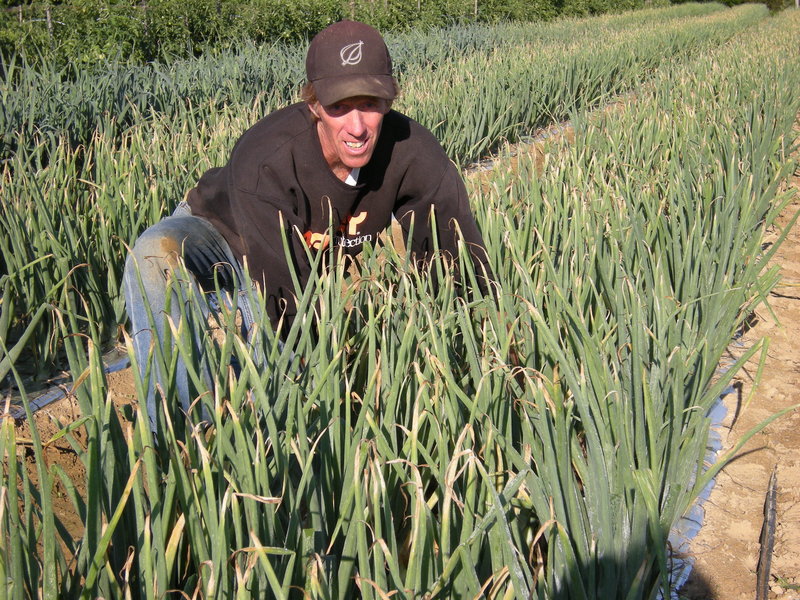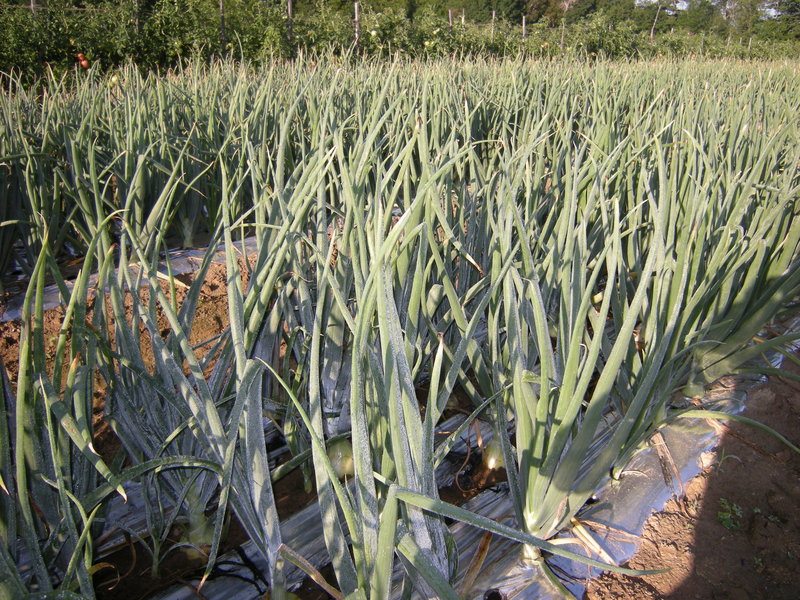Rusty Dewsnap is the onion baron of southern Maine. Every year he grows 25,000 organic onions. Their culture interests him so much that he has four books on the subject and subscribes to a magazine called “Onion World.”
Why onions?
“I just like to grow then,” says Dewsnap, 53, a resident of Dresden. “Why? I can’t tell you that. We all do things we can’t explain and this is one of them. I enjoy it.”
Onions grown by Dewsnap — some nearly as large as croquet balls — are all sold at Goranson Farm in Dresden, a thriving roadside business serving drive-by shoppers, farm markets and clients who buy crop shares on the principle of community supported agriculture.
Dewsnap grows his onions in a fertile sandy field belonging to Gorinson farm. That’s where I met him one morning recently to learn the secrets of growing onions. It was 7 a.m. and Dewsnap had been weeding since sunrise.
He starts early because he’s a full-time letter carrier for the Richmond Post Office, across the Kennebec River from Dresden. He walks 11.5 miles daily to complete his rounds.
But Dewsnap showed no sign of fatigue the morning we met, though the day was already hot as the sun beat down from a cloudless sky.
“Onions don’t tolerate weeds,” he explained, bending to pick small clumps of purslane growing here and there next-to onion bulbs planted through plastic mulch.
“If you let the weeds get too large before pulling them,” he said, it damages an onion’s roots when you pull it out. The plastic mulch helps.”
Dewsnap quickly summed up essentials of good onion culture:
• Choose long-day onions for Maine.
• Start onions indoors in February or March.
• Irrigate but don’t saturate.
• Grow onions from seed, not sets.
“Just about everyone grows their first onions from sets,” Dewsnap explained. “I know I did, and we tried them here at the farm. But they have more disease and they didn’t do that well. It seemed like a good idea to get them out of here.”
In Maine, where summer days are longer than they are down south, so-called long-day onions are the ones for the north. Dewsnap’s favorite varieties for Maine are Prince and Copra, famous for big round-bottomed onions that are good keepers. He also grows Red Bull, a sweet summer onion for use late July through fall.
Dewsnap sows onion seed in by scattering seed on the surface of a rich organic soil mix in a Goranson Farm greenhouse.
On a much smaller scale, I’ve successfully started onion seed on narrow trays set on east and south-facing windowsills. You will need several trays or rows of plant pots to start enough onions for your family’s winter supply.
Transplant to the garden in late April or early May when soil is workable and heavy frost is past. Plant onions every four inches in rows one foot apart. Rows are at 8-inch intervals at Goranson Farm, but Dewsnap suggests more space in the home garden
For those who use plastic mulch to keep down weeds, spread it tightly over the soil before setting out onions, then punch holes at correct intervals, planting one onion per hole. The backyard gardener setting out 200 or so onions might skip the mulch because weeding on that scale isn’t a big job.
Onions are perfect for organic culture. They’re rarely bothered by pests. Simply water when dry and stay on top of weeding. Harvest your crop before heavy fall rains. Then let bulbs dry in the sun until onionskins rustle. Drying generally takes three days to a week.
Some gardeners braid onion tops. Braids of onions hanging from beams in an old farm kitchen are attractive. As a braid-challenged person, I can’t master the technique. So I cut off the dry tops.
Store onions for winter in a dry place where it’s cold but not below freezing. Make sure there’s good air circulation around your stored onions. We keep our winter onions in a big wicker basket in an unheated room. A couple of planks under the basket keep air flowing.
Copra onions are best for storage.
At Gorinson Farm, good onion-growing technique pays off.
“It’s been a fabulous cooperative effort,” said Rob Goranson, who owns the farm with his wife, Jan. “You couldn’t ask for a better partner than Rusty. He’s sort of the front man and, between the three of us, we go at it right.”
So follow Rusty Dewsnap’s advice. You’ll be amazed by the size and good taste of your homegrown onions.
Most home gardeners can supply the family with tasty onions September through May. Considering prices at the supermarket, seed-grown onions are a practical crop that will save real money.
Lloyd Ferriss is a writer and photographer who lives in Richmond.
Send questions/comments to the editors.




Success. Please wait for the page to reload. If the page does not reload within 5 seconds, please refresh the page.
Enter your email and password to access comments.
Hi, to comment on stories you must . This profile is in addition to your subscription and website login.
Already have a commenting profile? .
Invalid username/password.
Please check your email to confirm and complete your registration.
Only subscribers are eligible to post comments. Please subscribe or login first for digital access. Here’s why.
Use the form below to reset your password. When you've submitted your account email, we will send an email with a reset code.